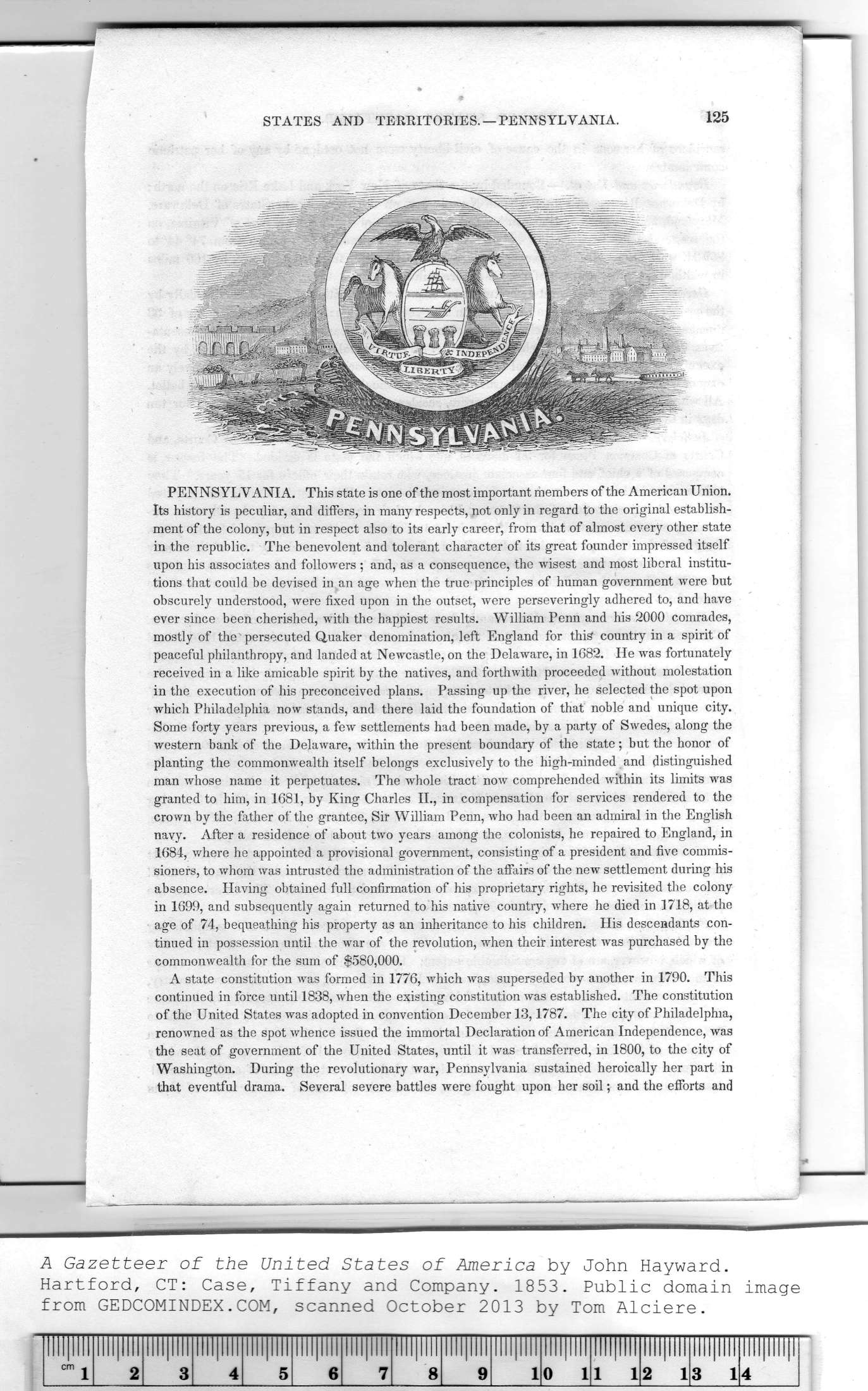|
|
Note: Ctrl and + increases the font size of the text below, Ctrl and - decreases it, and Ctrl and 0 resets it to default size.
STATES AND TERRITORIES.— PENNSYLVANIA. 125
PENN SYLV ANI A. This state is one of the most important members of the American Union.
Its history is peculiar, and differs, in many respects, not only in regard to the original establish-
ment of the colony, but in respect also to its early career, from that of almost every other state
in the republic. The benevolent and tolerant character of its great founder impressed itself
upon his associates and followers ; and, as a consequence, the wisest and most liberal institu-
tions that could be devised in an age when the true principles of human government were but
obscurely understood, were fixed upon in the outset, were perseveringly adhered to, and have
ever since been cherished, with the happiest results. William Penn and his 2000 comrades,
mostly of the persecuted Quaker denomination, left England for this' country in a spirit of
peaceful philanthropy, and landed at Newcastle, on the Delaware, in 1682. He was fortunately
received in a like amicable spirit by the natives, and forthwith proceeded without molestation
in the execution of his preconceived plans. Passing up the river, he selected the spot upon
which Philadelphia now stands, and there laid the foundation of that noble and unique city.
Some forty years previous, a few settlements had been made, by a party of Swedes, along the
western bank of the Delaware, within the present boundary of the state; but the honor of
planting the commonwealth itself belongs exclusively to the high-minded and distinguished
man whose name it perpetuates. The whole tract now comprehended within its limits was
granted to him, in 1681, by King Charles II., in compensation for services rendered to the
crown by the father of the grantee, Sir William Penn, who had been an admiral in the English
navy. After a residence of about two years among the colonists, he repaired to England, in
1684, where he appointed a provisional government, consisting of a president and five commis-
sioners, to whom was intrusted the administration of the affairs of the new settlement during his
absence. Having obtained full confirmation of his proprietary rights, he revisited the colony
in 1699, and subsequently again returned to his native country, w'here he died in 1718, at the
age of 74, bequeathing his property as an inheritance to his children. His descendants con-
tinued in possession until the war of the revolution, when their interest was purchased by the
commonwealth for the sum of $580,000.
A state constitution wras formed in 1776, which was superseded by another in 1790. This
continued in force until 1838, when the existing constitution was established. The constitution
of the United States was adopted in convention December 13,1787. The city of Philadelphia,
renowned as the spot whence issued the immortal Declaration of American Independence, was
the seat of government of the United States, until it was transferred, in 1800, to the city of
Washington. During the revolutionary war, Pennsylvania sustained heroically her part in
that eventful drama. Several severe battles were fought upon her soil; and the efforts and
|
mppiiim |
lllllllll |
lllllllll |
llll|llll |
llll|llll |
lllllllll |
llll|llll |
lllllllll |
lllllllll |
llll|llll|MI|llll |
lllllllll |
lllllllll |
lill|llll|l |
|
cm l| 2 |
3 |
4 |
5 |
6 |
7 |
8 |
9 |
1 |
0 l|l 1 |
2 1 |
3 1 |
4 |
|
